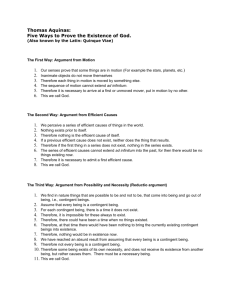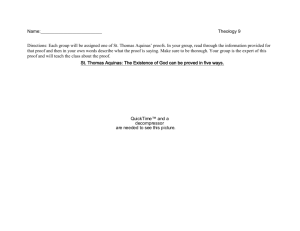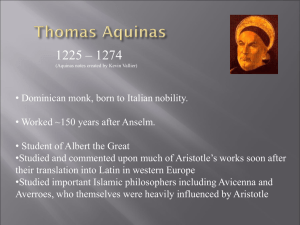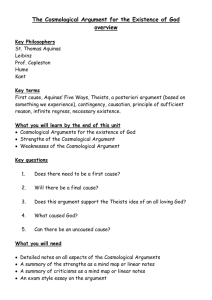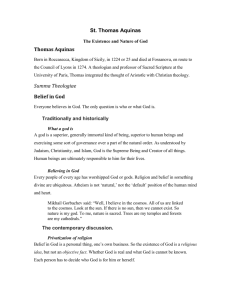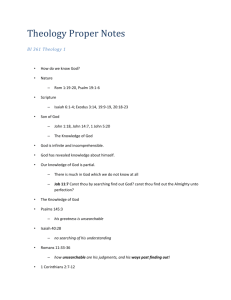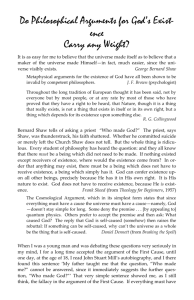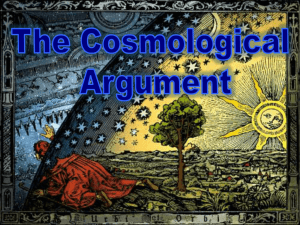Aquinas view
advertisement
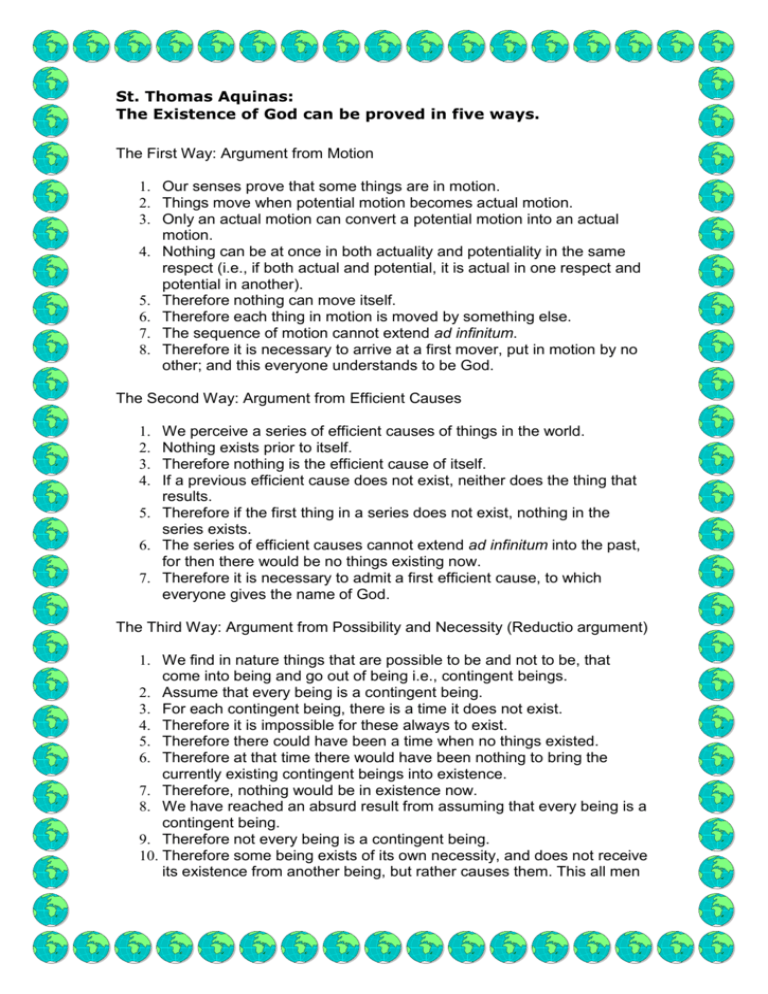
St. Thomas Aquinas:
The Existence of God can be proved in five ways.
The First Way: Argument from Motion
1. Our senses prove that some things are in motion.
2. Things move when potential motion becomes actual motion.
3. Only an actual motion can convert a potential motion into an actual
motion.
4. Nothing can be at once in both actuality and potentiality in the same
respect (i.e., if both actual and potential, it is actual in one respect and
potential in another).
5. Therefore nothing can move itself.
6. Therefore each thing in motion is moved by something else.
7. The sequence of motion cannot extend ad infinitum.
8. Therefore it is necessary to arrive at a first mover, put in motion by no
other; and this everyone understands to be God.
The Second Way: Argument from Efficient Causes
We perceive a series of efficient causes of things in the world.
Nothing exists prior to itself.
Therefore nothing is the efficient cause of itself.
If a previous efficient cause does not exist, neither does the thing that
results.
5. Therefore if the first thing in a series does not exist, nothing in the
series exists.
6. The series of efficient causes cannot extend ad infinitum into the past,
for then there would be no things existing now.
7. Therefore it is necessary to admit a first efficient cause, to which
everyone gives the name of God.
1.
2.
3.
4.
The Third Way: Argument from Possibility and Necessity (Reductio argument)
1. We find in nature things that are possible to be and not to be, that
come into being and go out of being i.e., contingent beings.
2. Assume that every being is a contingent being.
3. For each contingent being, there is a time it does not exist.
4. Therefore it is impossible for these always to exist.
5. Therefore there could have been a time when no things existed.
6. Therefore at that time there would have been nothing to bring the
currently existing contingent beings into existence.
7. Therefore, nothing would be in existence now.
8. We have reached an absurd result from assuming that every being is a
contingent being.
9. Therefore not every being is a contingent being.
10. Therefore some being exists of its own necessity, and does not receive
its existence from another being, but rather causes them. This all men
speak of as God.
The Fourth Way: Argument from Gradation of Being
1. There is a gradation to be found in things: some are better or worse
than others.
2. Predications of degree require reference to the “uttermost” case (e.g., a
thing is said to be hotter according as it more nearly resembles that
which is hottest).
3. The maximum in any genus is the cause of all in that genus.
4. Therefore there must also be something which is to all beings the
cause of their being, goodness, and every other perfection; and this we
call God.
The Fifth Way: Argument from Design
1. We see that natural bodies work toward some goal, and do not do so
by chance.
2. Most natural things lack knowledge.
3. But as an arrow reaches its target because it is directed by an archer,
what lacks intelligence achieves goals by being directed by something
intelligence.
4. Therefore some intelligent being exists by whom all natural things are
directed to their end; and this being we call God.
Which out of the following ways could be applied to God sustaining the created world?
Creatio Continua
Hebrews chapter 1
1
God’s Final Word: His Son
1In the past God spoke to our ancestors through the prophets at many times and in various
ways, 2but in these last days he has spoken to us by his Son, whom he appointed heir of all
things, and through whom also he made the universe. 3The Son is the radiance of God’s glory
and the exact representation of his being, sustaining all things by his powerful word. After he
had provided purification for sins, he sat down at the right hand of the Majesty in heaven.
4So he became as much superior to the angels as the name he has inherited is superior to
theirs.
Hebrews 1:3
3 He
is the radiance of the glory of God and the exact imprint of his nature, and he upholds
the universe by the word of his power. After making purification for sins, he sat down at the
right hand of the Majesty on high,
How does this relate to how God can sustain the created world?
THE COSMOLOGICAL ARGUMENT
Main Idea
The argument proposes that the existence of God is the best answer to the two questions
Why does anything exist? and Why does anything change? Nothing would exist unless
something brought it into existence, and nothing would happen unless it was started.
The Principle of Sufficient Reason
Anaximander (in ancient Miletus) argued that the Earth must be at rest, because there is no
more reason for it to move up than to move down. Archimedes said a balance with equal
weights stays level for the same reason. This claim rests on the principle that there must be
a reason for everything. It is a key component in Leibniz's version of the Cosmological
Argument.
The principle cannot be proved, but if it is true it supports the Cosmological Argument.
There must be a reason why things exist; there must be a reason why things are changing.
There must also be a reason why things are the way they are, and happen the way they
happen, rather than existing and happening some other way.
Plato (The Laws 894a-899c, in Hick pp. 72-79)
Movement is either caused, or self-generated. The second kind is superior, and is caused by
'soul' (psuché). Heavenly bodies such as the sun must have a soul, and the 'best soul' must
control the movement of the heavens, because that is regular and good.
Aristotle (Metaphysics)
God is the 'First Cause', and the supreme 'unmoved mover'. God is a remote impersonal
spirit which is the thing at which all change and action in the universe aims. Nothing would
happen if God did not exist. God is not the efficient cause of things (which directly leads to
their happening), but is their final cause (their ultimate purpose).
Thomas Aquinas (Hick pp. 83-84)
First Way ('from motion'): every movement is caused by some other movement, but this
chain of movers must stop somewhere, because movement would not happen without an
initiator.
Second Way (the 'first cause'): there must be an ultimate final cause for things, and we
observe intermediate ('efficient') causes succeeding one another, but these are only
possible if there is a first cause to begin the process.
Third Way (from 'possibility and necessity'): all natural things have contingent existence
(they can cease to be); if a thing can cease to be, then sooner or later it will cease to be;
therefore every natural thing would have ceased to exist by now; once everything
disappears, there is no way for it to come back into being on its own; therefore there must
be something which has necessary existence, which can endure when other things cease,
and so bring them back into existence; clearly something has kept natural things in
existence, because they obviously exist now.
Copleston's comments on Aquinas (Hick pp. 86-93)
1. Aquinas means a hierarchy of movements and causes existing now, not a sequence in
time.
2. Aquinas admits that time might be infinite, but says that the hierarchy of movements
and causes could not be.
3. The third way assumes that time is infinite (so that contingent things must have ceased
to exist by now).
4. The key to all the cosmological arguments is to admit that existence is a problem.
Process theology argues that the reality of God is not fixed and that
God himself is still developing. From this point of view, God is "dipolar" that is, has two "poles", one mental and one physical. The physical pole
is the material world itself, which acts almost as God's "body".
Because of this relationship, God is partly distinct and partly immersed in
the world - just as we are in our bodies. As a result, any suffering in
creation is also undergone by God, and creation itself is seen as a
cooperation between God and all other beings. Whether this cooperation
actually takes place is thus up to humanity - in other words, God cannot
force humans to do His will, but can only influence them.
Conclusion: God does not sustain the created world but is co-emergent with it
In your own words explain Process theology and how it relates to this subtopic

